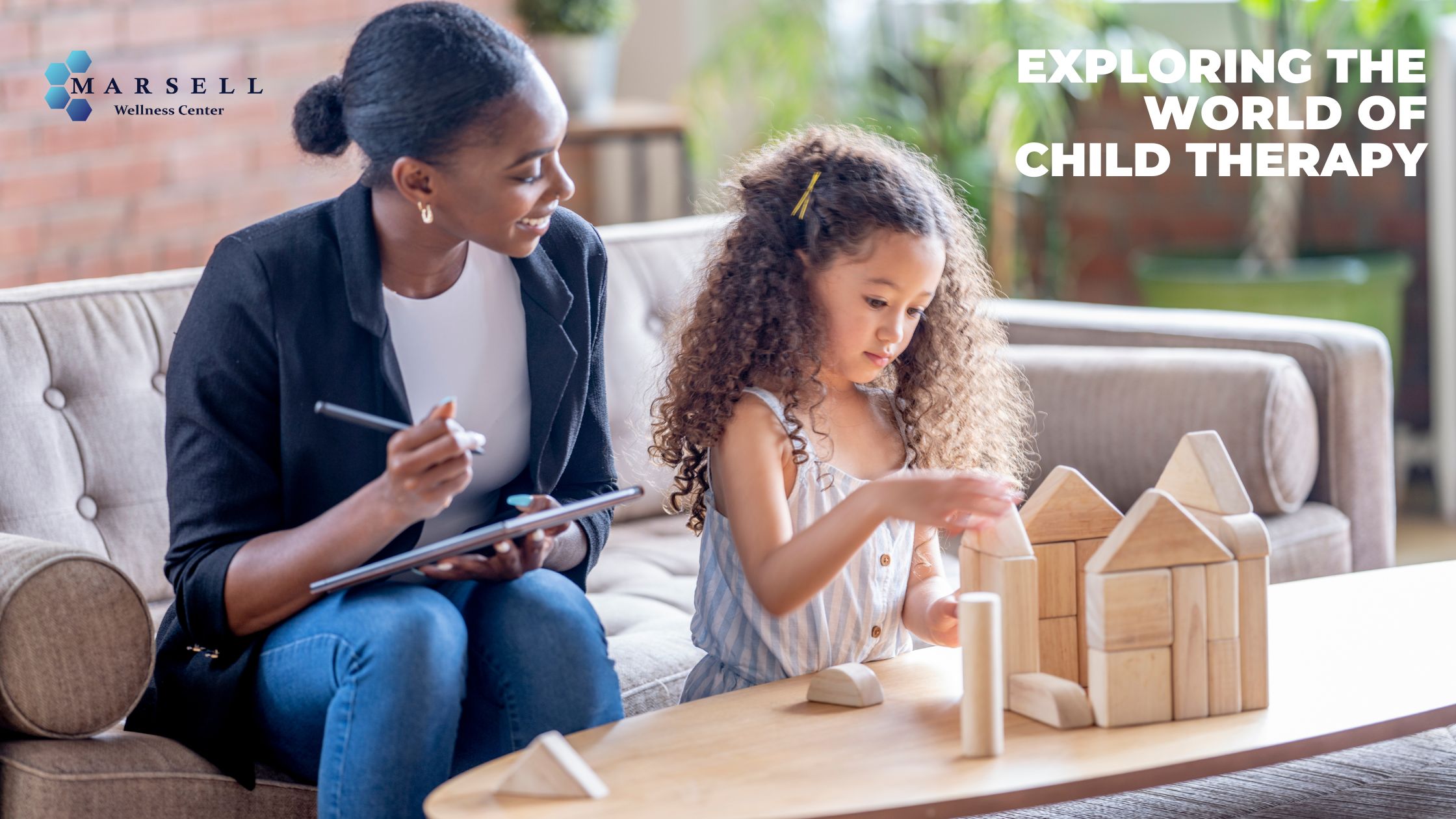Child Therapy in Riverside, Chula Vista, Escondido and Victorville, California
Childhood, a wondrous journey of exploration and self-discovery, can also be fraught with emotional challenges that require the adept guidance of professionals. The realm of child psychotherapy, a specialized facet within the broader landscape of mental health, has emerged to cater specifically to the unique emotional and psychological needs of young individuals. This comprehensive blog post delves deeply into the realm of child therapy, elucidating its significance, methods, and the pivotal role it plays in nurturing emotional resilience and fostering growth in children. With a dedicated presence in Riverside, Chula Vista, Escondido, and Victorville, California, the transformative services provided by MarSell Wellness Center are seamlessly woven into this narrative of empowerment.
Understanding Child Psychotherapy
Child psychotherapy, a dynamic discipline tailored to the developmental intricacies of children and adolescents, typically encompasses ages ranging from 4 to 17. While the parameters might slightly differ based on the therapist’s credentials and expertise, the common thread lies in the therapists’ specialized training in comprehending and working with young minds. In response to the frequent query from parents – “What is children’s therapy?” – the distinction between adult and child psychotherapy is evident. Child therapy harnesses techniques and modalities that are suitable for children’s unique cognitive capacities, engaging them in a manner that resonates deeply.
The Role of Child Therapists
At the heart of this transformative journey are child and youth therapists, adept professionals who guide young individuals through the labyrinth of their emotions and experiences. Armed with a profound understanding of evidence-based treatment modalities tailored for children, these therapists employ creative approaches to empower their young clients. Utilizing art therapy, play therapy, and other innovative techniques, child therapists provide a secure space for children to articulate their feelings, even when words may fall short. In Riverside, Chula Vista, Escondido, and Victorville, California, MarSell Wellness Center boasts a team of dedicated child therapists, each committed to nurturing emotional well-being in the youth.
Grief and Loss Therapy for Children
The tapestry of life often weaves experiences of grief and loss, transcending age and circumstances. Children, too, encounter these emotions, and here is where child therapists shine. Whether it’s the departure of a loved one or the transition to a new environment, these experiences can leave a lasting impact on a child’s emotional landscape. Child therapists, well-versed in the nuances of grief and loss therapy, create a supportive haven for children to voice their emotions of sorrow, bewilderment, and yearning. This structured therapeutic space allows children to process these emotions in a healthy manner, ultimately contributing to their emotional growth and resilience.
Challenges Addressed by Child Therapy
The spectrum of challenges that children and adolescents encounter is vast and varied. Behavioral issues, mood fluctuations, difficulties in social interactions – these are just a few of the hurdles that may impede a child’s emotional well-being. In Riverside, Chula Vista, Escondido, and Victorville, California, MarSell Wellness Center’s child therapists stand as pillars of support for children navigating these challenges. A child’s transition to a new school or neighborhood, changes in sleep or eating patterns, irritability, or diminishing interest in once-beloved activities – all these are indicative of a child in need of guidance and support.
The Journey Towards Emotional Resilience
Child therapy is not confined to addressing challenges; it is a voyage towards emotional resilience and growth. The nurturing environment fostered by child therapists serves as a fertile ground for children to deepen their understanding of their emotions and enhance their emotional intelligence. Through skill-building exercises, children learn to regulate their emotions, communicate effectively, and navigate the intricacies of social interactions. These skills not only empower children to face challenges head-on but also foster holistic personal development.
Conclusion
In essence, child therapy is a guiding light illuminating the path for young individuals as they traverse the intricate terrains of their emotional landscapes. With Riverside, Chula Vista, Escondido, and Victorville, California, serving as the backdrop, MarSell Wellness Center’s commitment to nurturing emotional resilience and growth shines even brighter. The skilled expertise of child therapists creates a cocoon of safety and understanding, enabling children to express themselves, process emotions, and cultivate a sturdy foundation of emotional well-being that will accompany them on their life journey. Just as a fledgling plant requires tender care to bloom into a robust tree, children deserve a nurturing environment that fosters their emotional well-being, and child therapy provides the essential nourishment to ensure their emotional flourishing.
Frequently Asked Questions (FAQs) about Child Therapy
1. What is child therapy, and who is it for? Child therapy, also known as child psychotherapy, is a specialized form of mental health treatment tailored to children and adolescents. It is designed to address emotional, behavioral, and psychological challenges that young individuals may face. Child therapists are trained to work with children aged 4 to 17, helping them navigate various issues such as anxiety, depression, grief, behavioral problems, and more.
2. How does child therapy differ from therapy for adults? Child therapy differs from therapy for adults in its approach and techniques. Child therapists use creative and age-appropriate methods, such as play therapy, art therapy, and storytelling, to engage children in the therapeutic process. These methods help children express their emotions and thoughts, as they may have difficulty communicating their feelings verbally.
3. What happens during a child therapy session? During a child therapy session, the therapist creates a safe and supportive environment where the child can freely express themselves. Depending on the child’s age and preferences, various therapeutic activities may be used to encourage self-expression. The therapist may engage in discussions, play, art, or role-playing to help the child explore their emotions and work through challenges.
4. How can I tell if my child needs therapy? Children may exhibit various signs that indicate they could benefit from therapy. These signs include changes in behavior, mood swings, difficulty in school, social withdrawal, increased irritability, changes in eating or sleeping habits, or a sudden loss of interest in previously enjoyed activities. If you notice persistent and concerning changes in your child’s behavior, seeking consultation from a child therapist can be beneficial.
5. Is it normal for children to need therapy? Yes, it is entirely normal for children to need therapy. Children, like adults, can experience a range of emotions and challenges. Therapy provides a safe space for them to express their feelings, learn coping strategies, and develop emotional resilience. Seeking therapy for your child is a proactive step towards ensuring their well-being and helping them build essential life skills.
6. How can child therapy help my child? Child therapy can have numerous benefits for your child’s emotional well-being. It helps children develop better communication skills, learn effective ways to manage their emotions, build self-esteem, and enhance problem-solving abilities. Additionally, therapy can assist children in understanding and coping with life changes, transitions, and challenging experiences.
7. How long does child therapy typically last? The duration of child therapy varies depending on the child’s needs and progress. Some children may benefit from short-term therapy to address specific concerns, while others may engage in longer-term therapy for more complex issues. The therapist will work collaboratively with you and your child to determine the appropriate treatment plan.
8. Is family involvement a part of child therapy? Yes, family involvement can be an integral part of child therapy. Family sessions may be incorporated to address family dynamics, communication patterns, and provide support for both the child and their caregivers. Collaborative family involvement can enhance the effectiveness of therapy and promote positive changes.
9. How do I find a qualified child therapist? Finding a qualified child therapist involves researching licensed mental health professionals who specialize in working with children and adolescents. Look for therapists with relevant credentials, experience, and a warm approach that resonates with your child. MarSell Wellness Center offers child therapy services in Riverside, Chula Vista, Escondido, and Victorville, California, with a team of trained and compassionate therapists dedicated to supporting your child’s emotional well-being.
10. How can I start the process of child therapy at MarSell Wellness Center? Starting the process of child therapy at MarSell Wellness Center is simple. Reach out to us through our website or contact our center directly. Our team will guide you through the initial steps, including scheduling an assessment to understand your child’s needs. We are committed to providing the best possible support for your child’s emotional growth and well-being.




